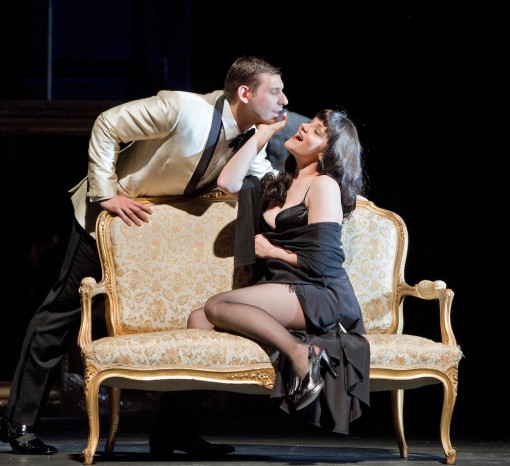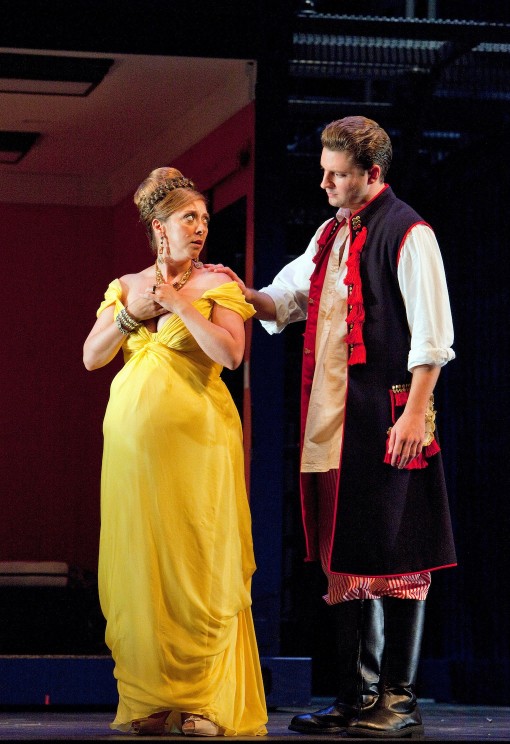Chabrier’s comic opera sparkles winningly at Bard Music Festival

Michele Angelini as Nangis and Andriana Chuchman as Minka in Chabrier's "Le roi malgré lui" at Bard College. Photo: Cory Weaver
A spirited sense of humor and ardent admiration for Wagner do not always go hand in hand. The French composer Emmanuel Chabrier (1841-1894) not only combined both qualities in his person – Vincent d’Indy once caught him muffling sobs during a performance of Lohengrin in Munich – but expressed them in two very different operas. Gwendoline, written in 1885, is Chabrier’s homage to Wagner; Le roi malgré lui (The King Despite Himself) is a classic opéra comique, sparkling with wit and charm.
A sense of irreverent fun dominated Friday night’s first U.S. staged production of Le roi, one of the central offerings in this year’s Bard Music Festival celebration of Saint-Saëns and his world. Conducted by Leon Botstein, who first revived the score in a concert performance in 2005, the American Symphony Orchestra and a fine cast of mostly young singers made another strong case for Chabrier’s vivacious music.
The opera’s plot, cooked up by a number of librettists but credited chiefly to Emile de Najac and Paul Burani, defies quick summary. At its heart is the figure of Henri de Valois who, at the close of the sixteenth century, found himself reluctantly pressed into becoming king of Poland after that country’s line of monarch’s had died out. Homesick for the pleasures of France amid the drab weather of Krakow and the rustic customs of his new subjects, Henri hatches a plot to have himself overthrown. This leads him to frame his closest friend, Nangis, for leading a conspiracy against him. To add to the confusion, he impersonates Nangis; Nangis, meanwhile, is mistaken for Henri for most of the opera. Both men are caught between encouraging and fighting off the amorous advances of two Polish women, Alexandra, a noblewoman whom Henri seduced in Venice not long ago, and Minka, a peasant girl whom Nangis saves from a boorish master. His plan foiled at every turn, Henri — exhausted and somewhat softened towards Poland by the promise of love — in the end resigns himself to becoming The King Despite Himself.
Another director might have tried to wrestle some sense from the chaotic plot. Thaddeus Strassberger, aided by set designer Kevin Knight, instead chose to pile on the gags in a fast-paced production that threw about tongue-in-cheek references about like firecrackers. Mattie Ulrich’s costumes mixed together different time periods, including eighteenth-century powdered wigs, sleek 1960s Riviera couture and the uniforms of a contemporary cleaning crew. Several members of the cast got to sing in underwear, including Liam Bonner’s Henri, who, for his first appearance, is wheeled on stage in a tanning bed. There is a poster of Pope John Paul II and a reference to James Bond’s The Man with the Golden Gun; the king’s bodyguard is caught in a gay tryst and Alexandra, whose belly has been straining the silk of her yellow cocktail dress throughout the opera, goes into labor in the final bars.
“In times like these, the king’s job is to come and go,” sings one of the characters. In productions like these, he might have added, his job is to look trim in his tricolore Speedos and sing beautifully. This the singers did almost uniformly. Bonner, who is endowed with a fine, generous baritone, seemed unsure at first of his reach within the auditorium and overindulged in a wide vibrato. But in duets he sounded particularly lovely, showing off a fine sense of phrasing. Michele Angelini was an elegant, insouciant Nangis, his smooth, youthful tenor clearly at home in French opera.
The most emotionally arresting moments were provided by the two female leads, Andriana Chuchman as Minka and Nathalie Paulin as Alexina. Chuchman’s soprano was warm and glowing, evenly produced across the range. To the occasional virtuosic fireworks Chabrier throws in for her, she brought a loving attention to detail. Paulin’s soprano is more burnished, her singing assured and precise. Frédéric Goncalves, singing the part of Alexandra’s insufficiently vigilant husband, Fritelli, was the only native Frenchman in the cast and sang the comic role with a muscular baritone and great brio.
In the substantial spoken dialogues Goncalves had a slight edge over his fellow cast members, who sometimes struggled with French pronunciation and projection of the spoken word. It’s a challenge that may be best addressed by rendering the spoken dialogue in English, as does Opera Lafayette, an American company specializing in this repertoire.
Despite the hyperactive production, Chabrier’s music ultimately stole the show, full of surprises, subtle orchestral colors and melodic inventiveness. The ASO played it with verve and a fine sense of balance, shaping the French, Polish and Italian musical idioms carefully without overindulging in caricature.
The King in Spite of Himself will be repeated at the Sosnoff Theater at Bard College on July 29, August 1 and 5 at 3 pm and on August 3 at 7 pm. Fishercenter.bard.edu/summerscape/2012; (845) 758 7412

Posted Jul 30, 2012 at 7:36 am by Nicholas Deutsch
It’s unclear why Bard is advertising this as the “first U.S. staged production”: the Juilliard School gave it some years back, as “The Reluctant King,” in an English version by Maurice Valency. I believe they used George Balanchine’s choreography for the “Fete Polonaise” [sorry, can’t access the circumflex accent in “fete”]. Thanks.